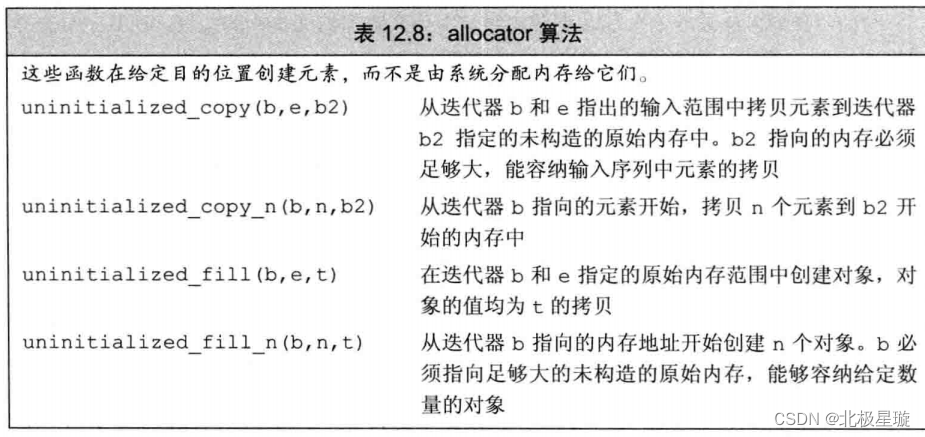- shared_ptr和unique_ptr都支持的操作,加上shared_ptr独有的操作
![![[Pasted image 20230923103844.png]]](https://img-blog.csdnimg.cn/74898ba9734a43ea9a52db3fbb57cf5a.png)
![![[Pasted image 20230923103855.png]]](https://img-blog.csdnimg.cn/de63ddf298af496c95532a9b89ecabe0.png)
- 每个shared_ptr都有一个关联的计数器,通常称其为引用计数,当调用了shared_ptr的构造函数时就会递增,当调用析构函数时就会递减,一旦一个shared_ptr的计数器为0的时候,它就会自动释放自己所管理的对象。
#include <iostream> #include <fstream> #include <array> #include <vector> #include <string> #include <exception> #include <algorithm> #include <stack> #include <deque> #include <numeric> #include <memory> int main() { std::shared_ptr<int> ptr1 = std::make_shared<int>(10); std::cout << ptr1.unique() << " " << ptr1.use_count() << std::endl; std::shared_ptr<int> ptr2 = std::make_shared<int>(10); std::cout << ptr1.unique() << " " << ptr1.use_count() << std::endl; std::shared_ptr<int> ptr3(ptr1); std::cout << ptr1.unique() << " " << ptr1.use_count() << std::endl;
}
cpp
1 1
1 1
0 2
```
-
如果想让STL的容器产生类似于shared_ptr指针的效果,可以进行下面的操作:(如果一个shared_ptr指向的对象的引用次数为0,则该对象会被销毁)
#include <iostream> #include <fstream> #include <array> #include <vector> #include <string> #include <exception> #include <algorithm> #include <deque> #include <numeric> #include <memory> #include <initializer_list> #include <exception> class StrBlob { public: typedef std::vector<std::string>::size_type size_type; StrBlob() : data(std::make_shared<std::vector<std::string>>()) {}; StrBlob(std::initializer_list<std::string> il) : data(std::make_shared<std::vector<std::string>>(il)) {}; StrBlob(std::vector<std::string> vec) : data(std::make_shared<std::vector<std::string>>(vec)) {}; ~StrBlob() = default; size_type size() const; void push_back(const std::string& t); void pop_back(); std::string front() const; std::string back() const; auto cbegin() -> decltype(std::cbegin(std::vector<std::string>())); auto cend() -> decltype(std::cend(std::vector<std::string>())); private: std::shared_ptr<std::vector<std::string>> data; void check(size_type i, const std::string& msg) const throw(const std::string&); }; std::vector<std::string>::size_type StrBlob::size() const { return data->size(); } void StrBlob::push_back(const std::string& t) { data->push_back(t); } void StrBlob::pop_back() { data->pop_back(); } std::string StrBlob::front() const { check(0, "front on empty StrBlob"); return data->front(); } std::string StrBlob::back() const { check(0, "back on empty StrBlob"); return data->back(); } void StrBlob::check(std::vector<std::string>::size_type i, const std::string& msg) const throw(const std::string&) { if (i >= data->size()) { throw std::out_of_range(msg); } } auto StrBlob::cbegin() -> decltype(std::cbegin(std::vector<std::string>())) { return this->data->cbegin(); } auto StrBlob::cend() -> decltype(std::cend(std::vector<std::string>())) { return this->data->cend(); } int main() { StrBlob str1({ "123", "fsdf","zcxv" }); StrBlob str2 = str1; str1.push_back("sdfsdfz"); str1.~StrBlob(); std::ostream_iterator<std::string> os(std::cout, " "); std::for_each(str2.cbegin(), str2.cend(), [&os](std::string val) { os = val; }); return 0; }123 fsdf zcxv sdfsdfz -
智能指针不允许进行内置指针到智能指针间的隐式转换,只能显示转换。下面是shared_ptr和new结合使用的各种函数
#include <iostream> #include <fstream> #include <array> #include <vector> #include <string> #include <exception> #include <algorithm> #include <deque> #include <numeric> #include <memory> #include <initializer_list> #include <exception> std::shared_ptr<int> clone(int p) { //return new int(p);不能隐式转换 return std::shared_ptr<int>(new int(p)); } int main() { std::shared_ptr<int> ptr1; std::shared_ptr<double> ptr2(new double(42));//可以通过构造函数转换 //std::shared_ptr<int> ptr3 = new int(1024);不能隐式转换 return 0; }![![[Pasted image 20230923144221.png]]](https://img-blog.csdnimg.cn/d41716db173f4496ad4abfa492eb9ead.png)
![![[Pasted image 20230923153455.png]]](https://img-blog.csdnimg.cn/f154a6beb43a43e1ba505b3a4faefee6.png)
![![[Pasted image 20230923161047.png]]](https://img-blog.csdnimg.cn/2cd190f68e844feaad5bd71d9c4757e0.png)
-
不要混用普通指针和智能指针,尽量都是用智能指针,如果混用二者会产生以下未定义行为。智能指针相对于普通指针的区别有当函数使用智能指针的时候,如果抛出异常,则栈解退的时候会自动调用析构函数释放内存,而使用普通指针的时候则不会delete掉
void process(std::shared_ptr<int> ptr) { ; } int main() { std::shared_ptr<int> p(new int(42)); process(p); int i = *p; std::cout << i << std::endl; int* x(new int(1024)); //process(x); 不能将int*显式转换为一个shared_ptr<int>()类型的指针 process(std::shared_ptr<int>(x));//如果将x显式类型转换,则可能导致x的内存被释放 int j = *x;//未定义行为:x是一个悬空指针! std::cout << j << std::endl; return 0; }42 -572662307 -
unique_ptr操作,一般情况下是不允许拷贝unique_ptr,但是如果从函数返回一个unique_ptr值或者返回一个局部对象拷贝的情况下是允许的。
![![[Pasted image 20230923154021.png]]](https://img-blog.csdnimg.cn/f575fdf1966f40dca9ba29ad0aa61a49.png)
![![[Pasted image 20230923161112.png]]](https://img-blog.csdnimg.cn/817287cb8ef24524ad4d164a57319236.png)
#include <vector>
#include <string>
#include <exception>
#include <algorithm>
#include <deque>
#include <numeric>
#include <memory>
#include <initializer_list>
#include <exception>
std::unique_ptr<std::string> clone1(std::string str)
{
return std::unique_ptr<std::string>(new std::string(str));
}
std::unique_ptr<std::string> clone2(std::string str)
{
std::unique_ptr<std::string> ret(new std::string(str));
return ret;
}
int main()
{
std::unique_ptr<std::string> ptr1(new std::string("sjkdfskdf"));
std::unique_ptr<std::string> ptr2(ptr1.release());
std::unique_ptr<std::string> ptr3(new std::string("kxcnsd"));
std::cout << *ptr2 << std::endl;
ptr2.reset(ptr3.release());
std::cout << *ptr2 << std::endl;
return 0;
}
-
weak_ptr的一些操作:
![![[Pasted image 20230923160922.png]]](https://img-blog.csdnimg.cn/c43a23a1351340fdb5706e5e03d854d7.png)
-
由于分配的内存并不是一个数组类型,因此不能对动态数组调用begin和end函数,也不能用范围for语句来处理动态数组中的元素,我们所说的动态数组并不是数组类型
-
指向数组的unique_ptr支持一下操作,由于shared_ptr不支持通过[]访问的操作,因此需要使用get函数。
![![[Pasted image 20230923163322.png]]](https://img-blog.csdnimg.cn/45a0008aaeff4b019aa827eb65bf2b5f.png)
#include <iostream>
#include <fstream>
#include <array>
#include <vector>
#include <string>
#include <exception>
#include <algorithm>
#include <deque>
#include <numeric>
#include <memory>
#include <initializer_list>
#include <exception>
int main()
{
std::unique_ptr<int[]> up(new int[10]);
std::shared_ptr<int> sp(new int[10], [](int* p) {delete[] p; });
for (size_t i = 0; i != 10; ++i)
{
up[i] = i;
*(sp.get() + i) = 2 * i;
}
for (size_t i = 0; i < 10; ++i)
{
std::cout << up[i] << "/" << *(sp.get() + i) << " ";
}
return 0;
}
- allocate的使用:
![![[Pasted image 20230923170327.png]]](https://img-blog.csdnimg.cn/5687b9bc913745db90aca9b165a46d7b.png)
#include <iostream>
#include <fstream>
#include <array>
#include <vector>
#include <string>
#include <exception>
#include <algorithm>
#include <deque>
#include <numeric>
#include <memory>
#include <initializer_list>
#include <exception>
int main()
{
int n;
std::allocator<std::string> alloc;//可以分配string内存的allocator对象
std::cin >> n;
auto const start = alloc.allocate(n);//分配十个内存,start是指向该内存开头的指针
auto end = const_cast<decltype(alloc.allocate(n))>(start);//end即构造完成的内存的下一个位置
alloc.construct(end++, 10, 'c');//构造一个含有10个c的字符串
alloc.construct(end++, "sdfksd");//构造一个sdfksd的字符串
for (auto it = start; it != end; ++it)
{
std::cout << *it << " ";//输出已经构造的空间的字符串
}
std::cout << std::endl;
alloc.destroy(--end);//重置一个已经构造的空间,但是并不会销毁
for (auto it = start; it != end; ++it)
{
std::cout << *it << " ";
}
alloc.deallocate(start, n);//销毁所有已分配的空间
return 0;
}
5
cccccccccc sdfksd
cccccccccc
![[Pasted image 20230923171456.png]]
#include <iostream>
#include <fstream>
#include <array>
#include <vector>
#include <string>
#include <exception>
#include <algorithm>
#include <deque>
#include <numeric>
#include <memory>
#include <initializer_list>
#include <exception>
int main()
{
std::allocator<int> a,b;
auto beginPtrA = a.allocate(10);
auto beginPtrB = b.allocate(10);
std::uninitialized_fill_n(beginPtrA, 10, 5);
for (size_t i = 0; i < 10; ++i)
{
std::cout << *(beginPtrA + i) << " ";
}
std::cout << std::endl;
std::uninitialized_copy_n(beginPtrA, 10, beginPtrB);
for (size_t i = 0; i < 10; ++i)
{
std::cout << *(beginPtrA + i) << " ";
}
return 0;
}
5 5 5 5 5 5 5 5 5 5
5 5 5 5 5 5 5 5 5 5
- 智能指针shared_ptr和unique_ptr重载删除器,都可以用普通函数,仿函数和未捕获任何类型的lambda表达式,但是unique需要传递一个函数指针
#define _CRT_SECURE_NO_WARNINGS 1 #include <iostream> #include <string> #include <memory> #include <deque> #include <vector> #include <algorithm> #include <functional> void deleter(int* x) { std::cout << "普通函数删除器" << std::endl; delete[] x; } class Deleter { public: void operator() (int* x) { std::cout << "仿函数删除器" << std::endl; delete[] x; } }; int main() { std::shared_ptr<int> shPtr1(new int[5], deleter); std::shared_ptr<int> shPtr2(new int[2], std::function<void(int*)>(Deleter())); std::shared_ptr<int> shPtr3(new int[7], [](int* x) { std::cout << "lambda表达式删除器" << std::endl; delete[] x; }); std::unique_ptr<int[], std::function<void(int*)>> unPtr1(new int[5], deleter); std::unique_ptr<int[], std::function<void(int*)>> unPtr2(new int[6], std::function<void(int*)>(Deleter())); std::unique_ptr<int[], std::function<void(int*)>> unPtr3(new int[7], [](int* x) { std::cout << "lambda表达式删除器" << std::endl; delete[] x; }); return 0; }






















 64
64











 被折叠的 条评论
为什么被折叠?
被折叠的 条评论
为什么被折叠?








